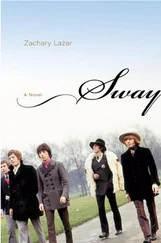Meyer shook his head and indicated that they should go back downstairs to the foyer to talk. When Ben got too loud, Meyer nudged him toward the door and they went out on the stoop in the cold air. Nothing about what he said sounded true — as he told the story even Ben began to realize this. Charlie Luciano had disappeared. Someone should have called Meyer hours ago but they hadn’t called him. Vito Genovese should have called.
They went into the apartment so he could get his things. Anne was stooped forward in the kitchen with her crossed arms at her breasts, still hardly awake, tangled hair rising above her head. The spattered milk had almost dried on the wall. He looked at her and walked into the sitting room. The lamp with its tasseled shade cast a pale glow on the curtains, the plaid chairs, the Daily Mirror stacked on the floor. He put his tie back on and smoothed his hair with his hands, then he took the homburg off its block and put it on. He was working the combination of the safe when he turned to find her in the archway. She was staring at him, only faintly confused now. Ben came up behind her.
“Never leave an Irishman in charge,” he said. “This Scanlon goes out for a pleasure drive, two o’clock a.m., the shvantz forgets the keys to the garage.”
She pushed him away, turning to Meyer. “What’s going on?”
“I don’t have time right now.”
“Meyer.”
He told her to go to bed. He had one hand on the small of his back, the half-opened safe door in his other. He was tired and so he brought the Colt right out into the room, tucking it into his belt. He hitched his trousers, then secured the gun again, then he drew his coat shut by jerking both lapels.
“We’re going to a dark garage in the middle of the night,” he said. “You wanted an answer and I’m giving you an answer.”
She stood there receding into vagueness. People you knew began to fade in this way, like angels or ghosts.
The bridge was empty and gleaming in the dark, and Ben had his pistol on the seat between them as they crossed the river into Manhattan. Pale globes lit up the steel cables and the huge pointed arches of the far tower. All he could see of Ben in the dark was his silhouette, his hat, the shoulder of his camel-hair coat.
“Jesus Christ,” Ben said. “I’m in there talking about Scanlon locking himself out of the garage.”
Meyer shook his head. Madison Street, Pike, Allen. Ben opened the trunk and Meyer held up the flashlight and they got their things and went into a card game in the basement of a grocer’s on Rivington. Maybe he was too tired to evaluate any of this. Maybe Vito Genovese hadn’t wanted to disturb him at home. He should have called.
He brought the pipe down on the dealer’s wrist and Ben flailed at everyone’s heads with an iron bar, the lamp swinging on its chain. Shadows flashed and tilted on the shop walls, hats aslant, the players bucking back in their folding chairs. They all went to the ground, the money scattered among the broken glass and blood. The dealer wore a seaman’s cap and a shirt rolled to the elbows. He lay on his hip where the game had been, his legs slowly peddling, braying. A damp stain spread down the inseam of his pants. Meyer planted a foot on his collarbone, then struck the wrist again where it was already broken. He could feel the scream travel up his leg, childlike and shrill. The splintered bone jabbed out through the skin in a dark smear. He held his foot in place and watched the roll and jerk, about to hit him again, not doing it, not kicking him.
He dropped the pipe and breathed. He looked Ben in the eye and Ben glared back, hamstrung, knowing it was over but not wanting it to be over. His face was handsome but distorted. He let the bar fall to the floor and told them where Vito Genovese could find them, and then they left.
“He should have called,” Meyer said.
“Next time he’ll call. I’ll take you up to the hotel.”
“We need to find Charlie.”
His hands felt greasy from gripping the pipe. The baby would have all of this history now before it even came into the world. The baby would have a stunted mind. You put tiny mitts on a baby’s hands so it wouldn’t scratch its own face.
IV
Adhesive tape covered [Luciano’s] mouth. His face and head were bruised, his eyes swollen almost shut. A knife wound had opened his right cheek, the cut stretching from his eye to his chin. There was blood on his shirt and tiny holes as if he had been pricked with an ice pick.
As Lansky bent over his friend, [Luciano] groaned and tried to open his eyes. It was difficult, but he recognized Lansky and managed a grin….
“Nobody’ll believe I got taken for a ride and lived. It just ain’t natural.”
“You’re just lucky, I guess,” said Lansky….
Lucky, as everyone now called him, was quickly back on the street.
The doctor broke the news gently. Bernard, as the boy had been named before birth, was a cripple….
“It’s a judgment,” [Anne] screamed. “A judgment from God.”
— Hank Messick, Lansky
5 Criminology BROOKLYN, 2010
In 2010, after Gila had told me of her affair with Lansky, I took the 3 train to Brownsville, the only white person in the car until a few Hasidim got on and then off again somewhere where the tracks rose aboveground. The 24-hour deli was shut on all sides, the steel doors tagged with graffiti. Lott Avenue, Rockaway Avenue — beyond weeds and ailanthus trees stretched a vast asphalt lot, empty except for a row of electrical boxes near the chain-link fence. I took a photograph. I took another photograph of an old building with four garbage cans chained in front of it beside the Olutunu Cherubim & Seraphim Church. “Can it be saved?” asked a man in an army coat, speaking about the building or perhaps the world. On Pitkin Avenue people loitered and smoked and shopped— Fish Sandwich, Burger, ATM —but the side streets were almost empty, lined with row houses, a storefront church, a group of Caribbean men playing dominos on the hood of someone’s car. There were once seventy Orthodox synagogues in Brownsville. There were still dairy cows in that part of Brooklyn then. My grandparents on my father’s side had lived there, people I hardly knew. Number 33 Chester Street was where Meyer Lansky and his family had first lived after coming from Grodno, before they moved to the Lower East Side. All that world was gone now. Now 33 Chester Street was a vacant lot full of construction debris and weeds. Across from it was a juvenile detention facility that took up an entire block, a pink brick structure with almost no windows, concertina wire atop the high walls, catching plastic.

The destination of this journey is home. Upon arrival, we will find, as we might have expected, that home is no longer there.
Number 33 Chester Street.
All this lore I know now. All this lore because of what Gila Konig told me before she died.
6 Immigrants, Part 2 NEW YORK, 1982
Gila watched the leaves in the Park rattle on the trees or billow into the shapes of clouds when the wind shifted — elms and alders and planes. European trees, American trees. There had been whole forests of such trees outside Foehrenwald, even outside Bergen-Belsen, not that she remembered them as anything more distinct than an idea. The years of her earliest childhood had become a cubist blur of trees, leaves, frost. All that time living inside her own head — once you started that, it was difficult to stop. Budapest, Belsen, Foehrenwald, Tel Aviv. Now it was 1982. Her first week in New York, almost two years ago now, she had walked down Seventh Avenue and seen the garment district — mannequins in tiny plexiglass displays, steam rising from the manholes, hand trucks and aluminum racks crammed with parkas. She’d looked at the crowd and could imagine no way in.
Читать дальше













